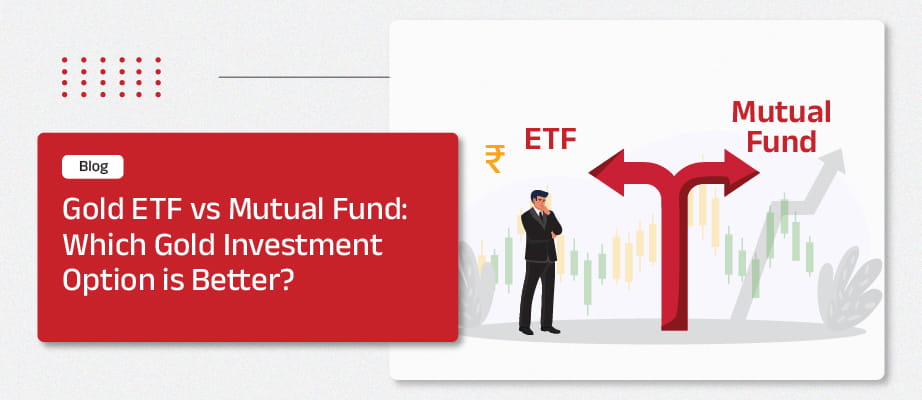-
Our Products
Our FundsFocus Funds
-
Self Care
Self-ServiceFind InformationWays To TransactPartner Solutions
-
Downloads
- Learnings
- About Us
-
More
-
Shareholders
-
Shareholders
-
Updates
-
-
SIP Calculators
- Back
-
Shareholders
Gold ETF or Gold Mutual Fund? Key Differences Every Investor Should Know

Jun 09, 2025
5 min
0 Rating
From wearing gold jewellery to gifting coins at weddings, gold has been a part of the culture. Gold offers valuable investment as well, helping battle against economic cycles and inflation. Its ability to be easily converted into liquid assets adds to its appeal.
Investors primarily go for two liquid gold assets, including Gold Exchange-Traded Funds (ETFs) and Gold Mutual Funds. Both of these assets offer long-term investment in gold; However, they may differ in their structure, investment strategy and management. A gold ETF fund captures the current price of physical gold, facilitating direct investment. Meanwhile, gold mutual funds are investments in gold-specific securities like gold, gold mining stocks and derivatives. This blog will discuss gold ETF vs gold mutual fund to provide you with key insights and differences for each.
Understanding Gold ETF Meaning
A gold exchange-traded fund is an investment approach designed to track gold pricing in the market. These investments are made on tangible gold or future contracts, making it flexible to invest in the gold market without handling the physical metal. They are listed on stock exchanges, and their value changes with the change in gold's price, but they are managed like mutual funds. Each unit of the gold ETF represents 99.5% of pure gold in 1 gram. For investors who want a gold ETF, they must open a Demat account.
Understanding Gold Mutual Fund
Gold mutual funds are investment vehicles that primarily allocate money to gold Exchange-Traded Funds (ETFs) and other gold-related assets to generate returns. It is important to note that they are open-ended funds which mainly invest in gold ETFS, and they can be bought or sold at any time at the fund’s Net Asset Value (NAV). A thematic gold mutual fund invests in securities like refining companies and gold mining. Therefore, these mutual funds offer great investment opportunities to investors. It helps them create diversified portfolios. Additionally, they can help mitigate overall investment risk while offering the potential for stable, gold ETF returns.
Gold ETF vs Gold Mutual Fund: How Are They Different
A gold ETF fund differs from a gold mutual fund in diverse ways. Here are the main differences between the two:
Holding:
Investors can buy or sell a gold ETF fund with the help of brokers or through a Demat Account. These ETFs are credited and debited in your demat account when you purchase them. However, when it comes to gold mutual funds, there are no such obligations.
Investment Method:
Both of these gold fund options also differ in their method of investment. Gold mutual funds are done based on SIP (Systematic Investment Plan) with a minimum amount of ₹500 as units to the required gold fund on the existing NAV. Meanwhile, a gold ETF needs a purchase of 1 unit as a minimum value, which is equal to 1 gram of gold. Therefore, this proves that the required minimum amount for an ETF investment is comparably higher.
Cost of Transaction:
The two most popular gold investments differ significantly in their costs. A gold mutual fund can be said to have higher costs, including entry and exit loads. Alternatively, the gold ETFs do not have any entry or exit loads but apply charges on brokerage and demat. The annual cost of ETFs is between 0.5% and 1%, and the gold mutual fund ranges between 0.10% and 1.2%.
Liquidity:
Since a gold ETF is traded on stock exchanges, it means they are open to many buyers when you sell your unit. Gold ETFs are generally more liquid as they are traded on stock exchanges throughout the day. Gold Mutual Funds can only be redeemed at the end-of-day NAV.
A Quick Breakdown of the Gold ETF and Mutual Fund Differences
Features |
Gold Mutual Funds |
Gold ETFs |
Investment in |
Gold ETs |
In physical gold of 99.5% purity |
Minimum Investment |
Many Gold Mutual Funds now allow SIPs starting as low as ₹100. |
Equal to the price of 1 gram of gold, some platforms may have different minimum requirements. It's advisable to check with the specific platform or fund house. |
Exit Load |
Exit loads vary by fund. |
There is no exit load |
Requirement for Account |
A Demat Account is not required. It can invest online or via an agent. |
Needs a Trading and Demat Account |
SIP |
SIP can be utilised by investors for gradual investment. |
While traditional SIPs are more common with Mutual Funds, some platforms may offer SIP-like features for ETFs. |
Recommended to |
Best for investors with no Demat account but who prefer a SIP |
Best for investors looking for flexibility in buying or selling their units during market hours. |
Summing Up
It has been proven that investing in gold has always been a safer option while offering chances to diversify investment portfolios. They serve as a shield against inflation or one's personal financial emergencies. Understanding gold mutual funds and the gold ETF meaning in depth will help you measure your financial stability and take a calculated approach accordingly. The key difference between these two attractive gold investments is what makes them unique. Both of these instruments help invest in alternative assets in a safe and hassle-free manner. So, consider your goals and risk appetite before the final investment decision.
Mutual Fund investments are subject to market risks, read all scheme related documents carefully.





 1800-270-7000
1800-270-7000



